Charles E W Bean, Diaries, AWM38 3DRL 606/248/1 - 1917 - 1931 - Part 13
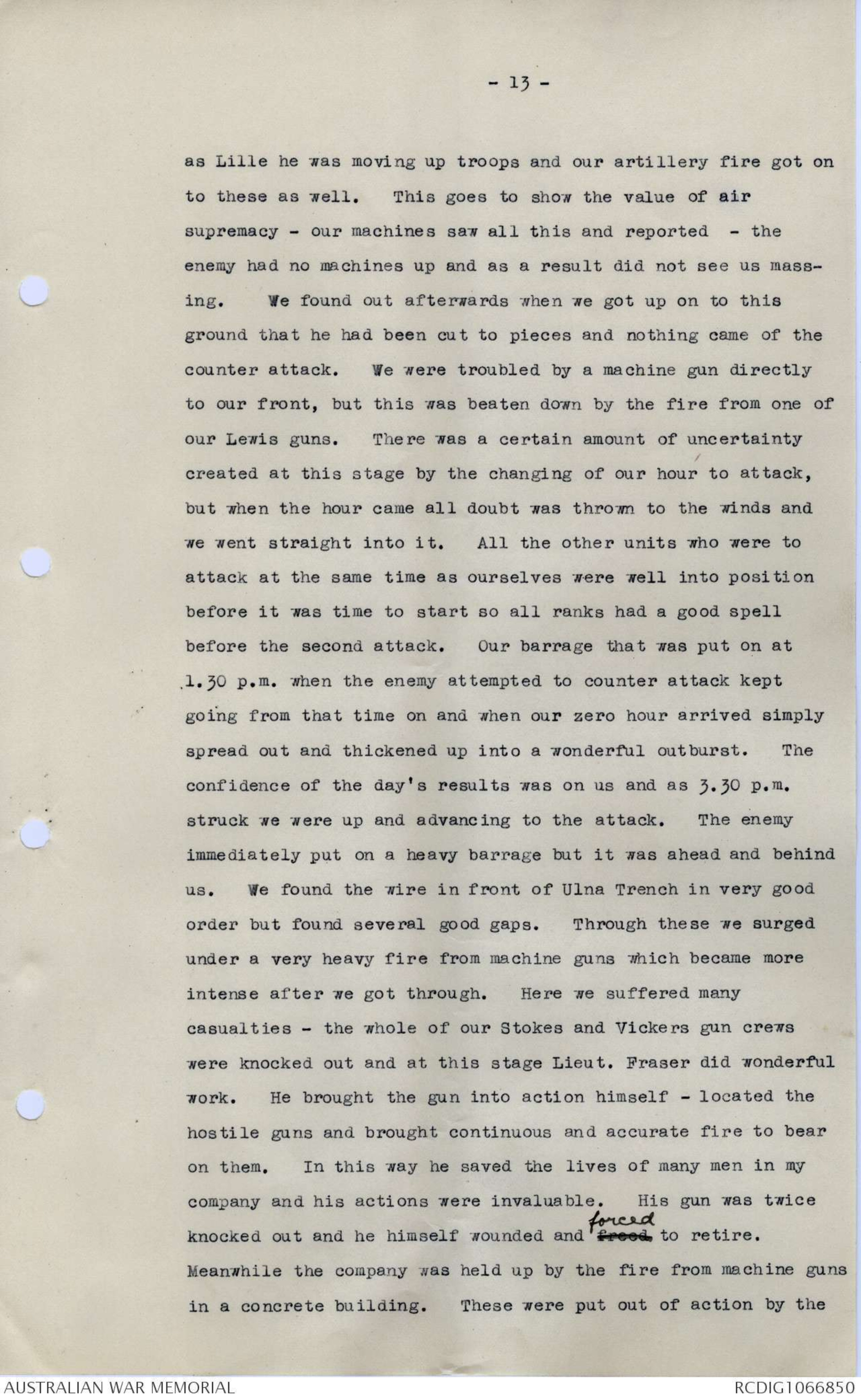
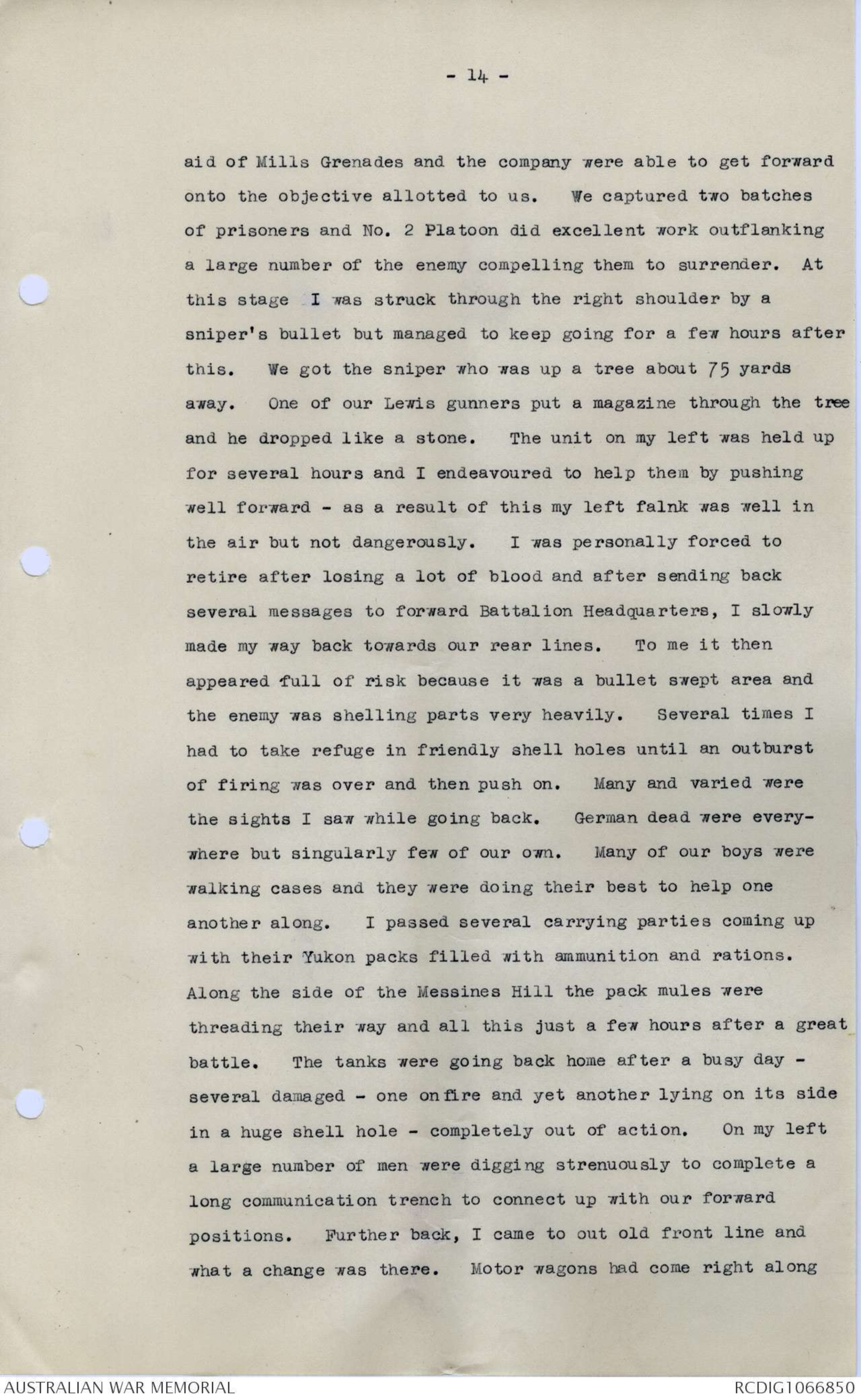
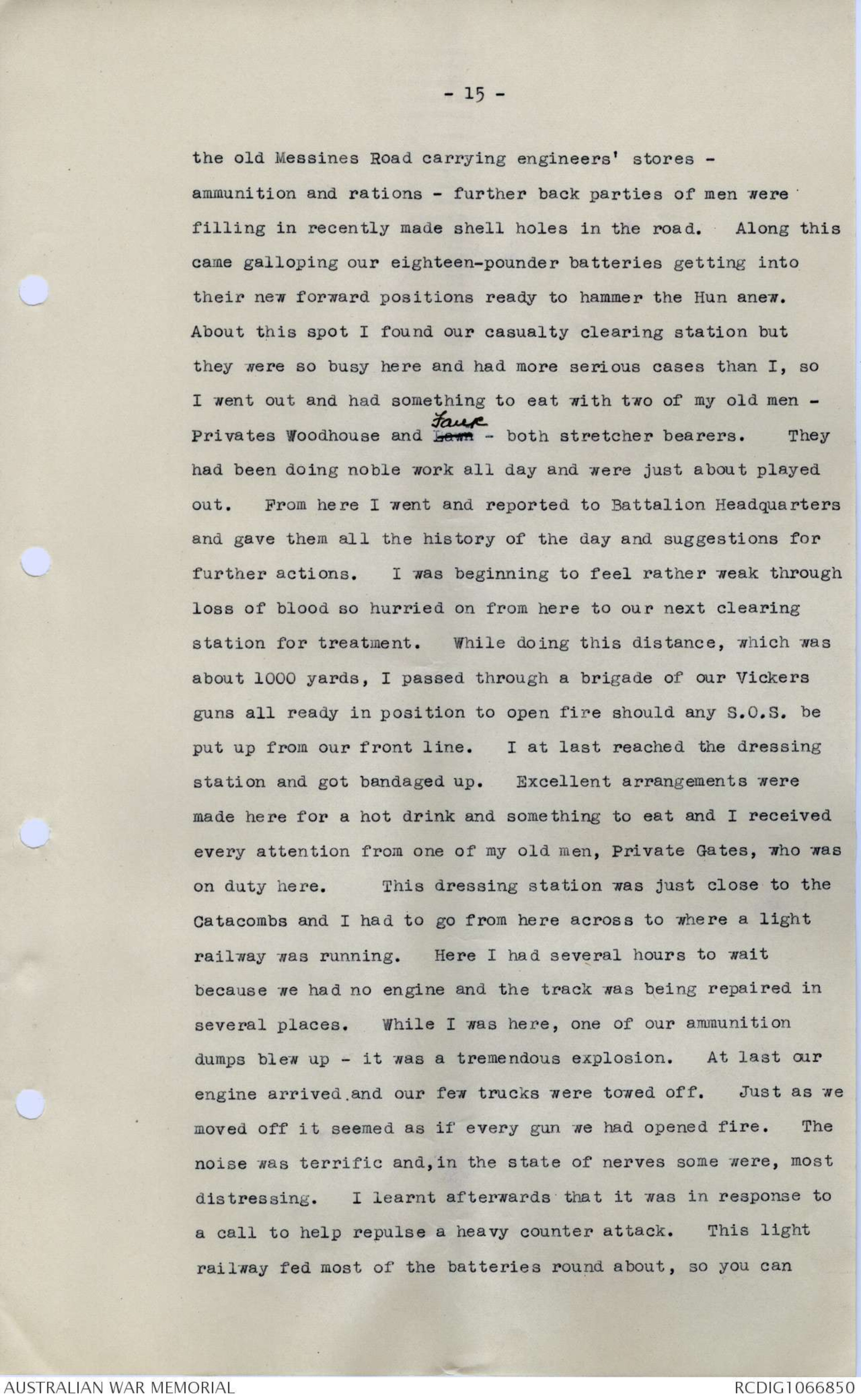
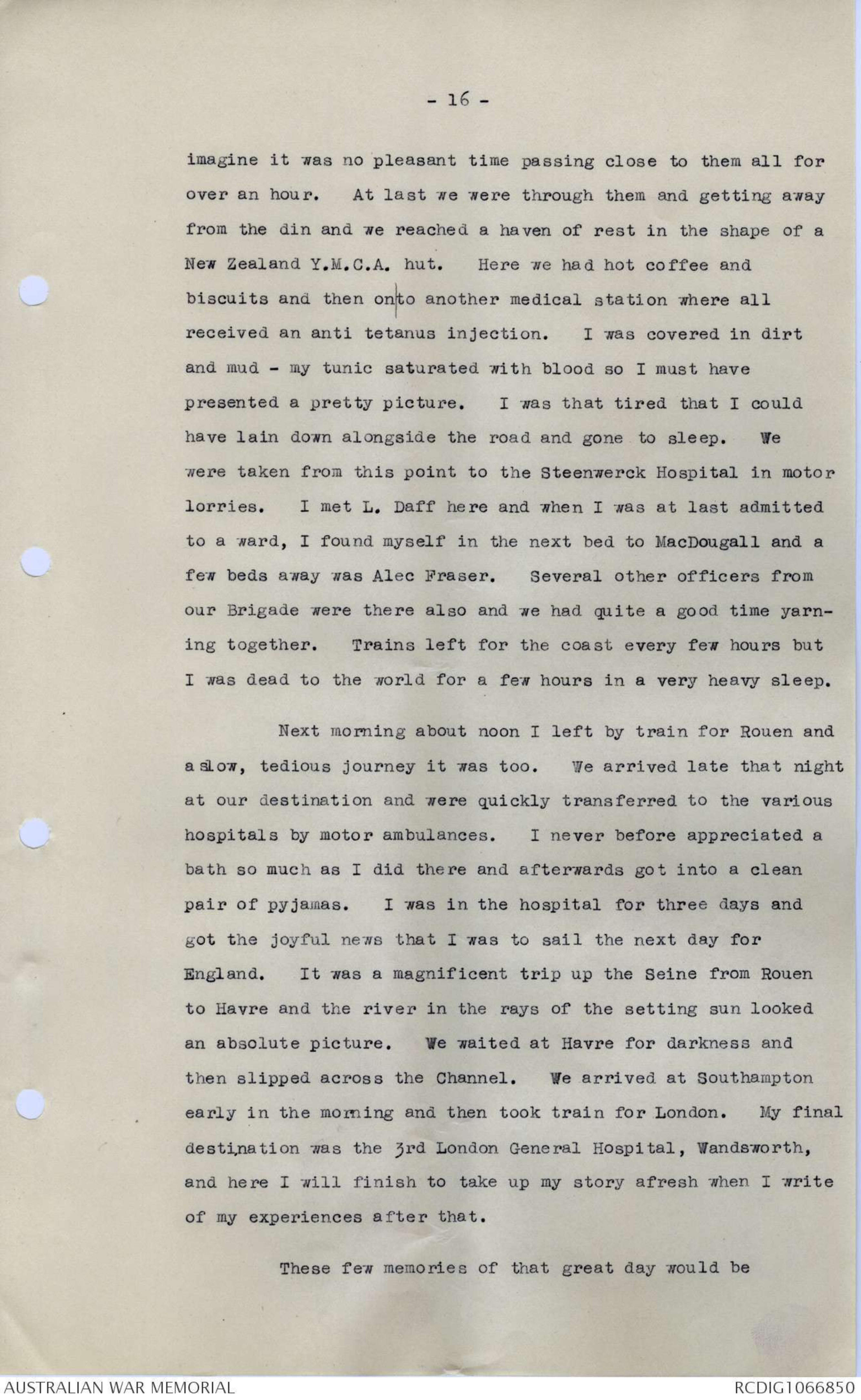
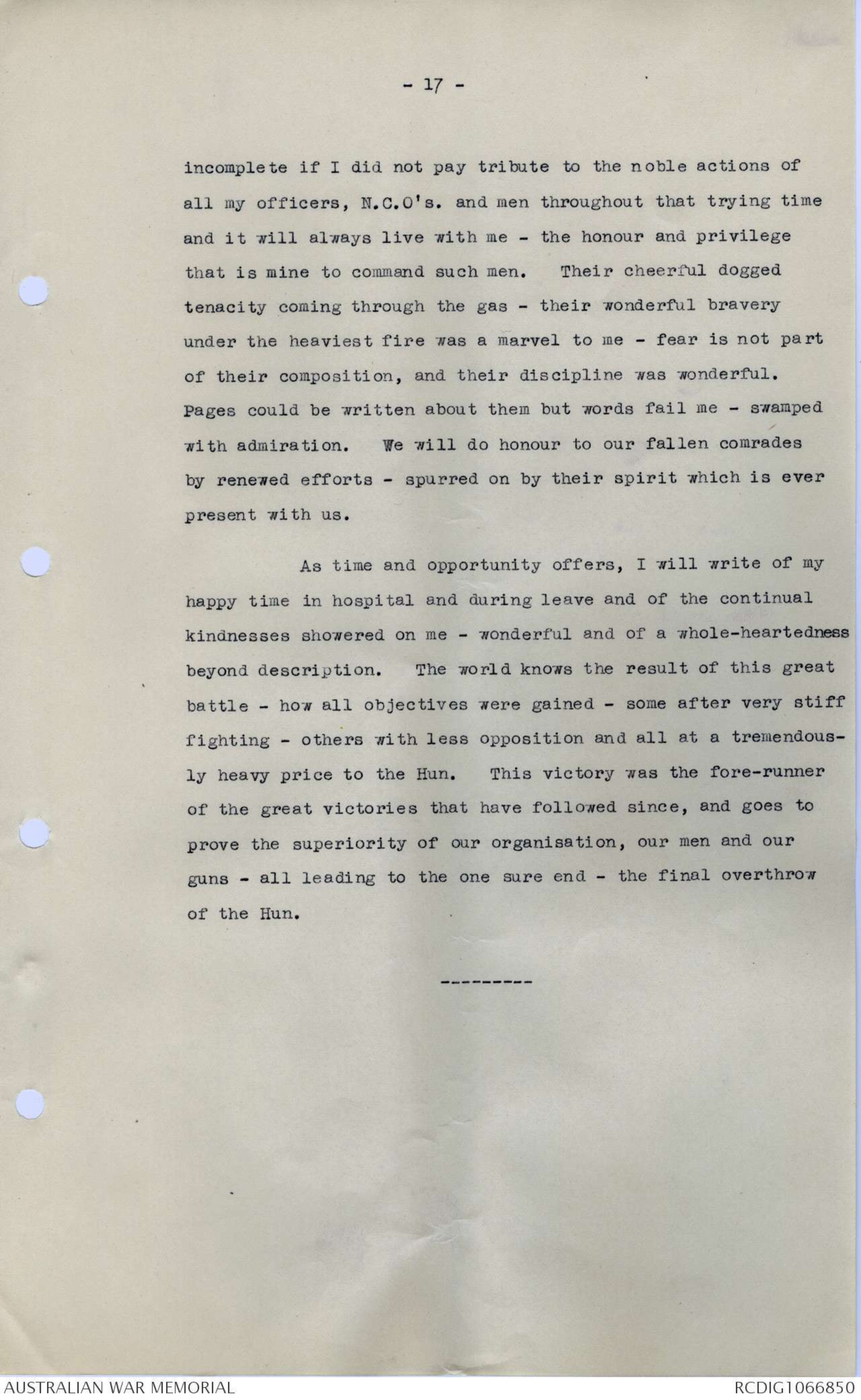
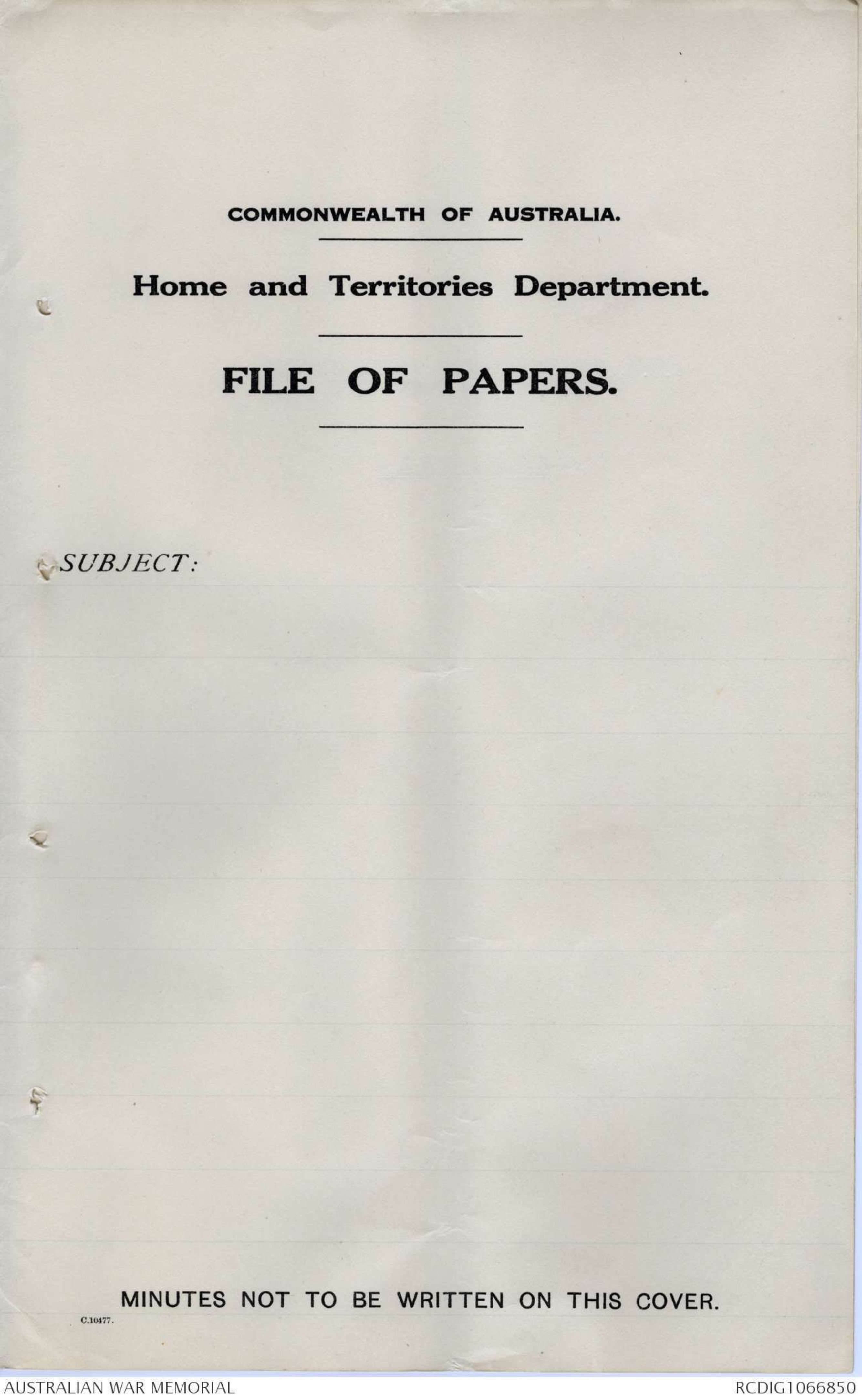
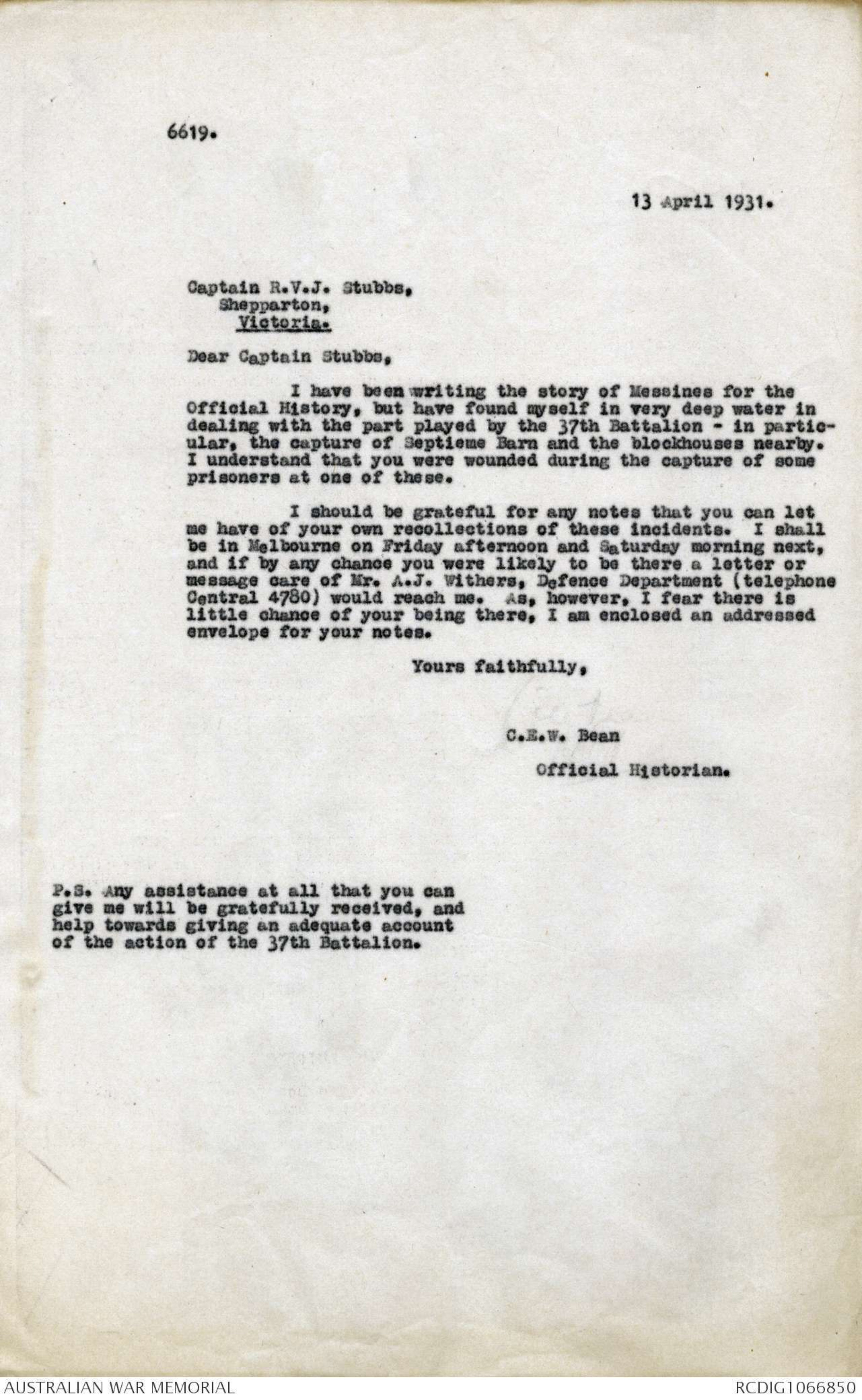
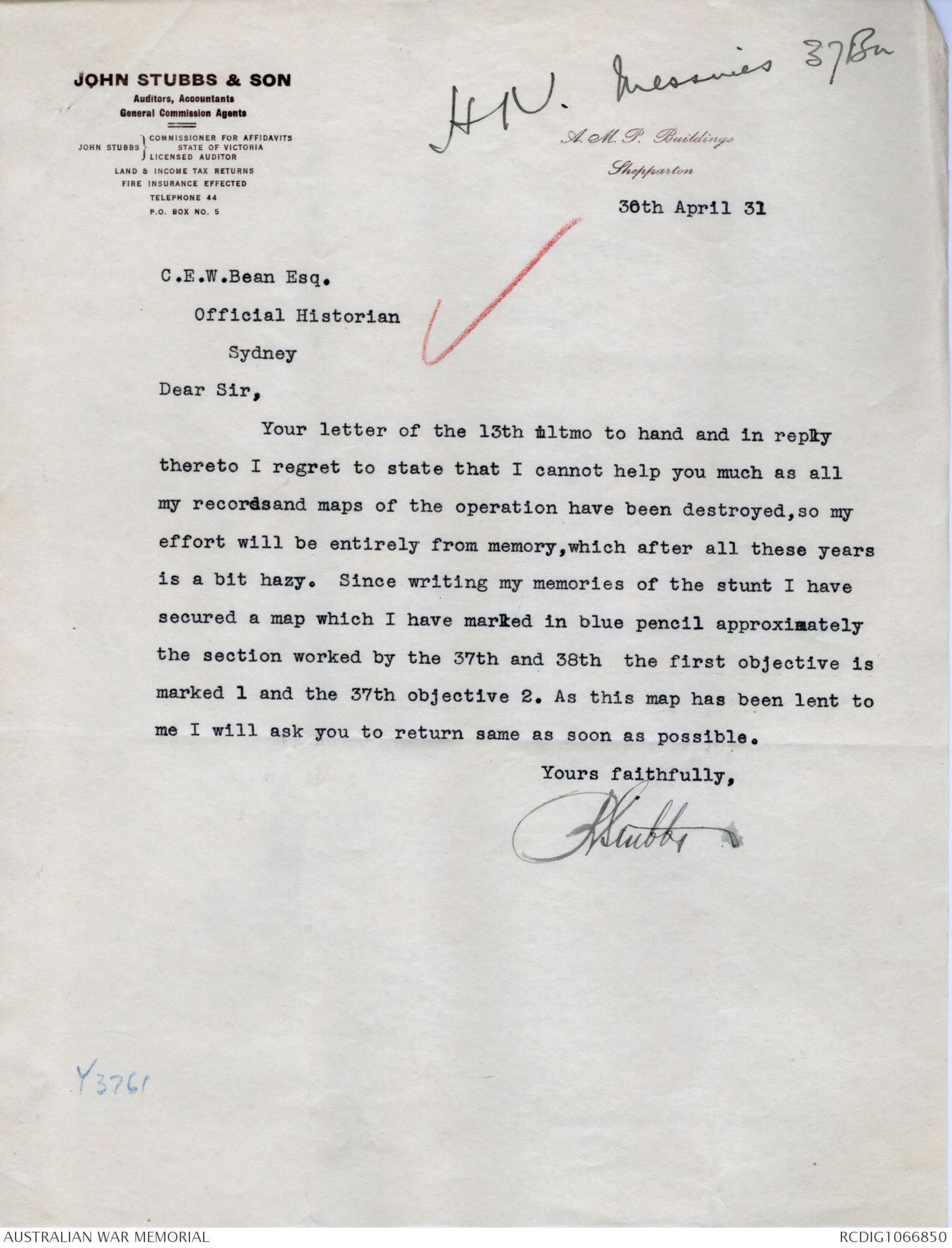
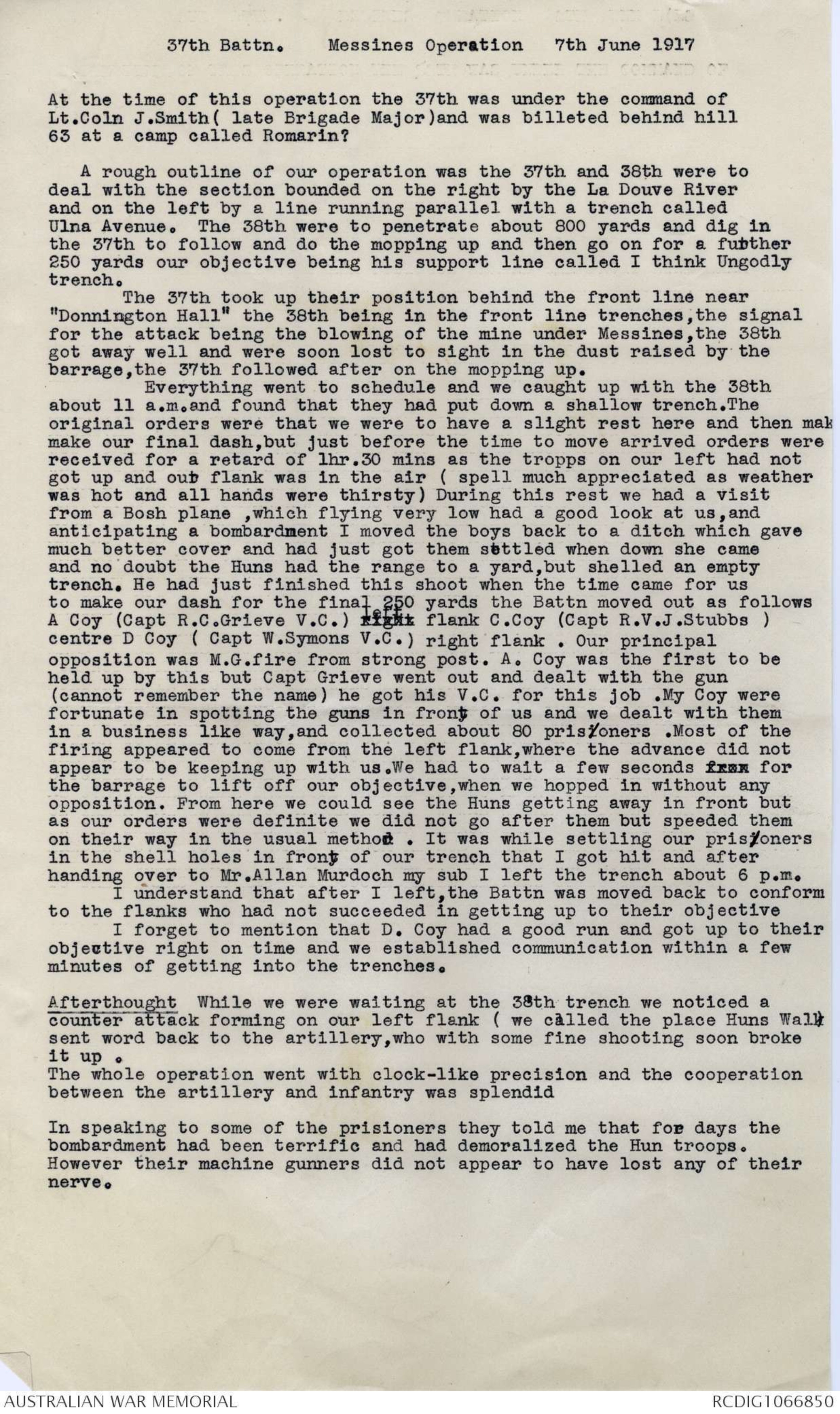
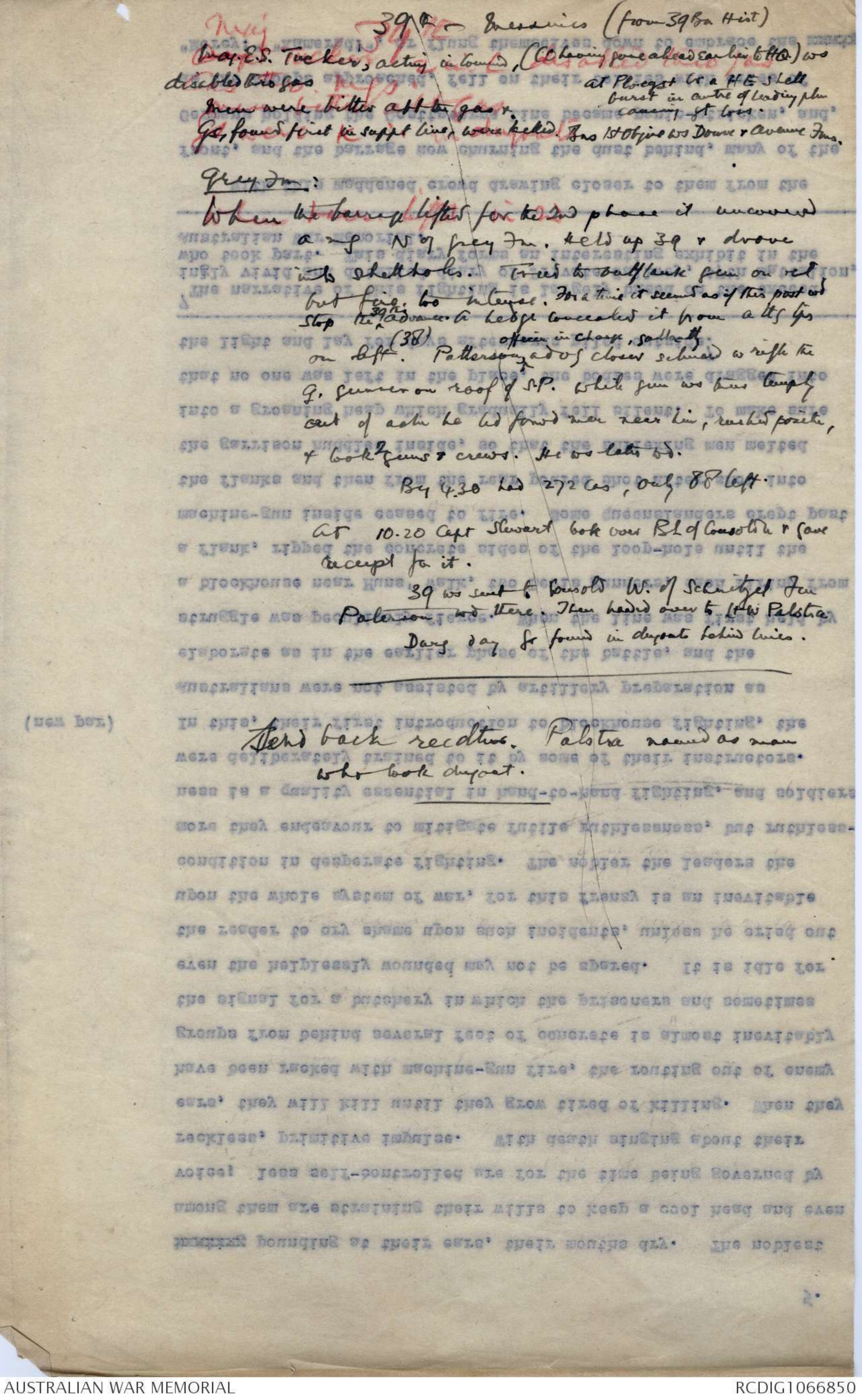
- 13 -
as Lille he was moving up troops and our artillery fire got on
to these as well. This goes to show the value of air
supremacy - our machines saw all this and reported - the
enemy had no machines up and as a result did not see us massing.
We found out afterwards when we got up on to this
ground that he had been cut to pieces and nothing came of the
counter attack. We were troubled by a machine gun directly
to our front, but this was beaten down by the fire from one of
our Lewis guns. There was a certain amount of uncertainty
created at this stage by the changing of our hour to attack,
but when the hour came all doubt was thrown to the winds and
we went straight into it. All the other units who were to
attack at the same time as ourselves were well into position
before it was time to start so all ranks had a good spell
before the second attack. Our barrage that was put on at
1.30 p.m. when the enemy attempted to counter attack kept
going from that time on and when our zero hour arrived simply
spread out and thickened up into a wonderful outburst. The
confidence of the day's results was on us and as 3.30 p.m.
struck we were up and advancing to the attack. The enemy
immediately put on a heavy barrage but it was ahead and behind
us. We found the wire in front of Ulna Trench in very good
order but found several good gaps. Through these we surged
under a very heavy fire from machine guns which became more
intense after we got through. Here we suffered many
casualties - the whole of our Stokes and Vickers gun crews
were knocked out and at this stage Lieut. Fraser did wonderful
work. He brought the gun into action himself - located the
hostile guns and brought continuous and accurate fire to bear
on them. In this way he saved the lives of many men in my
company and his actions were invaluable. His gun was twice
knocked out and he himself wounded and freed forced to retire.
Meanwhile the company was held up by the fire from machine guns
in a concrete building. These were put out of action by the
- 14 -
aid of Mills Grenades and the company were able to get forward
onto the objective allotted to us. We captured two batches
of prisoners and No. 2 Platoon did excellent work outflanking
a large number of the enemy compelling them to surrender. At
this stage I was struck through the right shoulder by a
sniper's bullet but managed to keep going for a few hours after
this. We got the sniper who was up a tree about 75 yards
away. One of our Lewis gunners put a magazine through the tree
and he dropped like a stone. The unit on my left was held up
for several hours and I endeavoured to help them by pushing
well forward - as a result of this my left falnk was well in
the air but not dangerously. I was personally forced to
retire after losing a lot of blood and after sending back
several messages to forward Battalion Headquarters, I slowly
made my way back towards our rear lines. To me it then
appeared full of risk because it was a bullet swept area and
the enemy was shelling parts very heavily. Several times I
had to take refuge in friendly shell holes until an outburst
of firing was over and then push on. Many and varied were
the sights I saw while going back. German dead were everywhere
but singularly few of our own. Many of our boys were
walking cases and they were doing their best to help one
another along. I passed several carrying parties coming up
with their Yukon packs filled with ammunition and rations.
Along the side of the Messines Hill the pack mules were
threading their way and all this just a few hours after a great
battle. The tanks were going back home after a busy day -
several damaged - one on fire and yet another lying on its side
in a huge shell hole - completely out of action. On my left
a large number of men were digging strenuously to complete a
long communication trench to connect up with our forward
positions. Further back, I came to out old front line and
what a change was there. Motor wagons had come right along
- 15 -
the old Messines Road carrying engineers' stores -
ammunition and rations - further back parties of men were
filling in recently made shell holes in the road. Along this
came galloping our eighteen-pounder batteries getting into
their new forward positions ready to hammer the Hun anew.
About this spot I found our casualty clearing station but
they were so busy here and had more serious cases than I, so
I went out and had something to eat with two of my old men -
Privates Woodhouse and Lawn [[Faure?]] - both stretcher bearers. They
had been doing noble work all day and were just about played
out. From here I went and reported to Battalion Headquarters
and gave them all the history of the day and suggestions for
further actions. I was beginning to feel rather weak through
loss of blood so hurried on from here to our next clearing
station for treatment. While doing this distance, which was
about 1000 yards, I passed through a brigade of our Vickers
guns all ready in position to open fire should any S.O.S. be
put up from our front line. I at last reached the dressing
station and got bandaged up. Excellent arrangements were
made here for a hot drink and something to eat and I received
every attention from one of my old men, Private Gates, who was
on duty here. This dressing station was just close to the
Catacombs and I had to go from here across to where a light
railway was running. Here I had several hours to wait
because we had no engine and the track was being repaired in
several places. While I was here, one of our ammunition
dumps blew up - it was a tremendous explosion. At last our
engine arrived and our few trucks were towed off. Just as we
moved off it seemed as if every gun we had opened fire. The
noise was terrific and, in the state of nerves some were, most
distressing. I learnt afterwards that it was in response to
a call to help repulse a heavy counter attack. This light
railway fed most of the batteries round about, so you can
- 16 -
imagine it was no pleasant time passing close to them all for
over an hour. At last we were through them and getting away
from the din and we reached a haven of rest in the shape of a
New Zealand Y.M.C.A. hut. Here we had hot coffee and
biscuits and then on|to another medical station where all
received an anti tetanus injection. I was covered in dirt
and mud - my tunic saturated with blood so I must have
presented a pretty picture. I was that tired that I could
have lain down alongside the road and gone to sleep. We
were taken from this point to the Steenwerck Hospital in motor
lorries. I met L. Daff here and when I was at last admitted
to a ward, I found myself in the next bed to MacDougall and a
few beds away was Alec Fraser. Several other officers from
our Brigade were there also and we had quite a good time yarning
together. Trains left for the coast every few hours but
I was dead to the world for a few hours in a very heavy sleep.
Next morning about noon I left by train for Rouen and
a slow, tedious journey it was too. We arrived late that night
at our destination and were quickly transferred to the various
hospitals by motor ambulances. I never before appreciated a
bath so much as I did there and afterwards got into a clean
pair of pyjamas. I was in the hospital for three days and
got the joyful news that I was to sail the next day for
England. It was a magnificent trip up the Seine from Rouen
to Havre and the river in the rays of the setting sun looked
an absolute picture. We waited at Harve for darkness and
then slipped across the Channel. We arrived at Southampton
early in the morning and then took train for London. My final
destination was the 3rd London General Hospital, Wandsworth,
and here I will finish to take up my story afresh when I write
of my experiences after that.
These few memories of that great day would be
- 17 -
incomplete if I did not pay tribute to the noble actions of
all my officers, N.C.O's. and men throughout that trying time
and it will always live with me - the honour and privilege
that is mine to command such men. Their cheerful dogged
tenacity coming through the gas - their wonderful bravery
under the heaviest fire was a marvel to me - fear is not part
of their composition, and their discipline was wonderful.
Pages could be written about them but words fail me - swamped
with admiration. We will do honour to our fallen comrades
by renewed efforts - spurred on by their spirit which is ever
present with us.
As time and opportunity offers, I will write of my
happy time in hospital and during leave and of the continual
kindnesses showered on me - wonderful and of a whole-heartedness
beyond description. The world knows the result of this great
battle - how all objectives were gained - some after very stiff
fighting - others with less opposition and all at a tremendously
heavy prices to the Hun. This victory was the fore-runner
of the great victories that have followed since, and goes to
prove the superiority of our organisation, our men and our
guns - all leading to the one sure end - the final overthrow
of the Hun.
COMMONWEALTH OF AUSTRALIA.
Home and Territories Department.
FILE OF PAPERS.
SUBJECT:
MINUTES NOT TO BE WRITTEN ON THIS COVER.
C.10477.
6619.
13 April 1931.
Captain R.V.J. Stubbs,
Shepparton,
Victoria.
Dear Captain Stubbs,
I have been writing the story of Messines for the
Official History, but have found myself in very deep water in
dealing with the part played by the 37th Battalion - in particular,
the capture of Septieme Barn and the blockhouses nearby.
I understand that you were wounded during the capture of some
prisoners at one of these.
I should be grateful for any notes that you can let
me have of your own recollections of these incidents. I shall
be in Melbourne on Friday afternoon and Saturday morning next,
and if by any chance you were likely to be there a letter or
message care of Mr. A.J. Withers, Defence Department (telephone
Central 4780) would reach me. As, however, I fear there is
little chance of your being there, I am enclosed an addressed
envelope for your notes.
Yours faithfully,
C.E.W. Bean
Official Historian.
P.S. Any assistance at all that you can
give me will be gratefully received, and
help towards giving an adequate account
of the action of the 37th Battalion.
JOHN STUBBS & SON
Auditors, Accountants
General Commission Agents
JOHN STUBBS} COMMISSIONER FOR AFFIDAVITS
STATE OF VICTORIA
LICENSED AUDITOR
LAND & INCOME TAX RETURNS
FIRE INSURANCE EFFECTED
TELEPHONE 44
P.O. BOX NO. 5
HN. Messines 37Bn
A.M.P. Buildings
Shepparton
30th April 31
C.E.W. Bean Esq.
Official Historian
Sydney 🗸
Dear Sir,
Your letter of the 13th ultmo to hand and in reply
thereto I regret to state that I cannot help you much as all
my recordsand maps of the operation have been destroyed, so my
effort will be entirely from memory, which after all these years
is a bit hazy. Since writing my memories of the stunt I have
secured a map which I have marked in blue pencil approximately
the section worked by the 37th and 38th the first objective is
marked 1 and the 37th objective 2. As this map has been lent to
me I will ask you to return same as soon as possible.
Yours faithfully,
R Stubbs
Y3761
37th Battn. Messines Operation 7th June 1917
At the time of this operation the 37th was under the command of
Lt.Coln J.Smith (late Brigade Major) and was billeted behind hill
63 at a camp called Romarin?
A rough outline of our operation was the 37th and 38th were to
deal with the section bounded on the right by the La Douve River
and on the left by a line running parallel with a trench called
Ulna Avenue. The 38th were to penetrate about 800 yards and dig in
the 37th to follow and do the mopping up and then go on for a further
250 yards our objective being his support line called I think Ungodly
trench.
The 37th took up their position behind the front line near
"Donnington Hall" the 38th being in the front line trenches, the signal
for the attack being the blowing of the mine under Messines, the 38th
got away well and were soon lost to sight in the dust raised by the
barrage, the 37th followed after on the mopping up.
Everything went to schedule and we caught up with the 38th
about 11 a.m. and found that they had put down a shallow trench. The
original orders were that we were to have a slight rest here and then mak
make our final dash, but just before the time to move arrived orders were
received for a retard of 1hr.30 mins as the tropps on our left had not
got up and our flank was in the air (spell much appreciated as weather
was hot and all hands were thirsty) During this rest we had a visit
from a Bosh plane, which flying very low had a good look at us, and
anticipating a bombardment I moved the boys back to a ditch which gave
much better cover and had just got them settled when down she came
and no doubt the Huns had the range to a yard, but shelled an empty
trench. He had just finished this shoot when the time came for us
to make our dash for the final 250 yards the Battn moved out as follows
A Coy (Capt R.C. Grieve V.C.) right left flank C.Coy (Capt R.V.J. Stubbs)
centre D Coy (Capt W. Symons V.C.) right flank. Our principal
opposition was M.G.fire from strong post. A. Coy was the first to be
held up by this but Capt Grieve went out and dealt with the gun
(cannot remember the name) he got his V.C. for this job. My Coy were
fortunate in spotting the guns in front of us and we dealt with them
in a business like way, and collected about 80 prisioners. Most of the
firing appeared to come from the left flank, where the advance did not
appear to be keeping up with us. We had to wait a few seconds frox for
the barrage to lift off our objective, when we hopped in without any
opposition. From here we could see the Huns getting away in front but
as our orders were definite we did not go after them but speeded them
on their way in the usual method. It was while settling our prisioners
in the shell holes in front of our trench that I got hit and after
handing over to Mr. Allan Murdoch my sub I left the trench about 6 p.m.
I understand that after I left, the Battn was moved back to conform
to the flanks who had not succeeded in getting up to their objective
I forget to mention that D. Coy had a good run and got up to their
objective right on time and we established communication within a few
minutes of getting into the trenches.
Afterthought While we were waiting at the 38th trench we noticed a
counter attack forming on our left flank (we called the place Huns Walk)
sent word back to the artillery, who with some fine shooting soon broke
it up.
The whole operation went with clock-like precision and the cooperation
between the artillery and infantry was splendid
In speaking to some of the prisoners they told me that for days the
bombardment had been terrific and had demoralized the Hun troops.
However their machine gunners did not appear to have lost any of their
nerve.
39th Messines (from 39 Bn Hist)
Maj. E.S. Tucker, acting in command, (CO having gone ahead earlier to HQ) ws disabled thro gas at Ploegst Crt a HE shell burst in centre of leading pln
Men were bitter abt the gas & causing gt loss.
Gs found first in suppt line, were killed. Bns 1st objve ws Douve & Avenue Fms.
Grey Fm:
When the barrage lifted for the 2nd phase it uncovered
a mg N of Grey Fm. Held up 39 & drove
into shellholes. Tried to outflank Germ on ret
but fire too intense. For a time it seemed as if this post wd
stop the ^39th advance a hedge concealed it from a [ltg?][tps?]
on left (38). Patterson ^officer in charge, gallantly advf closer [sib??ed?] w rifle the
G. gunner on roof of S.P while gun was put temply
out of action he led forwd men near him, rushed position,
& took 2 guns & crews. He was later wd.
By 4.30 had 272 Cas, only 88 left.
At 10.20 Capt Stewart took over BL of [Cousolate?] & gave
receipt for it.
39 was sent to [Cousold?] W. of Schnitzel Farm
Paterson wd there. Then headed over to Lt W Palstra
Durg day fr found in dugouts behind lines.
Send back recollective. Palstra named as man
who took dugout.
 Sam scott
Sam scottThis transcription item is now locked to you for editing. To release the lock either Save your changes or Cancel.
This lock will be automatically released after 60 minutes of inactivity.